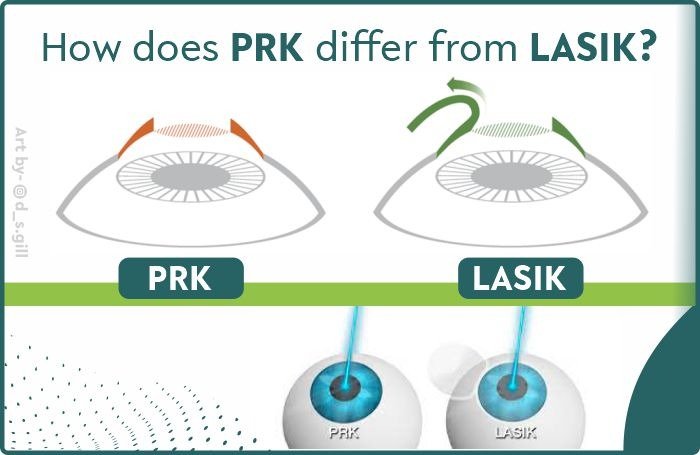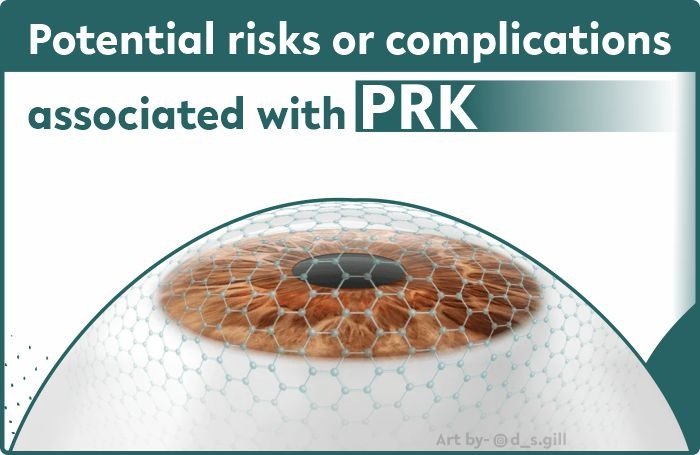Know everything about PRK (Photorefractive Keratectomy)
Photorefractive keratectomy, or PRK, is a good LASIK Alternative to free individuals from their dependence on eyeglasses and contacts. With laser accuracy that can’t be beat, PRK changes the shape of the cornea, giving people perfect vision. Grab the power of PRK, sometimes referred to as See a Transparent World, and benefit from this effective vision correction procedure as a popular alternative to Lasik. Our best Lasik surgeons will give you a life-changing PRK experience and take off the burden of spectacles for a lifetime.
What is PRK (Photorefractive Keratectomy)?
A type of laser eye surgery known as PRK, or photorefractive keratectomy, is intended to treat refractive defects such as nearsightedness (myopia), farsightedness (hyperopia), and astigmatism. Refractive keratectomy is a surgery that changes the shape of the cornea so that vision problems can be fixed without glasses or contacts.

How does PRK differ from LASIK?
Both PRK and LASIK are forms of laser eye surgery; however, the very first step of the procedure is where the two techniques diverge significantly. Before the cornea is reshaped, PRK is used to remove the epithelium, which is the cornea’s outer transparent layer. On the other hand, during LASIK, a flap is created in the cornea so that the surgeon may access the tissue underneath. For a more detailed understanding of PRK, Visit us at DR Manpreet Global Eye Hospital Patiala Punjab, rated as the best eye hospital in the region.
Who is a suitable candidate for PRK?
PRK is suitable for individuals with stable refractive errors and generally good eye health. Candidates should have a healthy cornea thickness and no other eye conditions that might complicate the surgery. In order to determine a candidate’s suitability. A refractive surgeon conducts a thorough examination before taking a call.
What should I expect during a PRK surgery?
The PRK Vision correction procedure is often done under local anesthesia and mainly on an outpatient treatment. Following the removal of the epithelial layer (the outermost layer of the cornea), the eye surgeon employs a surgical-grade laser to reshape the cornea in accordance with your unique prescription. On average, a complete PRK procedure takes approximately 15 minutes for each eye.
Is PRK surgery painful?
Some PRK Patients may experience some degree of discomfort or mild pain for a few days after the procedure as the epithelium heals. Pain medications and eye drops are prescribed to manage any discomfort. Most patients report significant improvement within a week.
How long does the recovery process take?
Complete visual recovery after PRK may take several weeks to a few months. Initially, vision may be blurry, but it gradually improves as the eye heals. Follow-up appointments are crucial to monitor progress, and post-surgery patients should strictly follow the post-operative care instructions advised by their surgeon.
Are there potential risks or complications associated with PRK?

As with any surgical procedure, PRK carries some risks, including infection, dry eyes, and under or over-correction. However, serious complications are rare. Discuss potential risks with our surgeon at Patiala’s best Lasik Laser Center during your consultation to make an informed decision. Expect well-meaning, Transparent expert advice at Dr. Manpreets LASIK Laser Center in Patiala, Punjab.
Can both eyes be treated on the same day?
While it’s common for both eyes to be treated during the same session, some surgeons prefer to stagger the procedures to monitor the healing process in one eye before treating the other.
How long do the results of PRK last?
PRK provides long-lasting results, and many patients experience improved vision for years or even decades. However, factors such as aging or changes in prescription over time may influence visual acuity.
What is the cost of PRK, and does insurance cover it?
The cost of PRK varies, and insurance coverage may depend on individual policies. While elective procedures like PRK are often not covered by insurance, some providers offer financing options. It is necessary to consult with both your insurance provider and the eye care center for particulars on the matter. You can visit us and meet our Refractive surgery counselors at Patiala’s best Lasik Laser Center during your consultation to make an informed decision. Expect well-meaning, transparent expert advice at Dr. Manpreets LASIK Laser Center in Patiala, Punjab.
How soon can I resume normal activities after PRK?
Most PRK patients can return to work and normal activities within a few days to a week. But, the precise recovery time is determined after taking into account your PRK parameters. Your PRK surgeon will advise you on specific guidelines regarding the resumption of your physical activities, eye care, and the use of eye drops.
Is PRK suitable for individuals with astigmatism?
The answer is that PRK is an excellent treatment for astigmatism. During the procedure, the corneal surface can be reshaped by the laser that is utilized during the treatment to correct spherical as well as cylindrical refractive faults.
Can PRK be repeated if my vision changes over time?
In certain occasional cases, a repeat PRK procedure (PRK Enhancement) may be performed if vision changes or if the initial correction is not sufficient. However, not all patients are candidates for a repeat procedure, and the decision depends on various factors.
How do I choose a qualified surgeon for PRK?
Finding a surgeon who is both skilled and experienced is necessary for a successful outcome. It would help if you looked for a board-certified surgeon who has a good reputation and has completed a considerable number of procedures, including laser eye surgery. Before selecting a choice, it is essential to get referrals from others, research their reputation online, and talk to several different surgeons.
Is there an age limit for PRK?
While there is no strict age limit for PRK, the stability of your vision is a significant factor. At Global Eye Hospital Patiala, Our refractive Surgeons generally prefer to perform laser eye surgery on individuals whose prescriptions have remained stable for at least a year. Kindly note that in PRK, individual experiences may vary. It’s advised to consult with our qualified best PRK surgeons for personalized advice based on your specific eye health and needs.

Tariq Masoodi
Tariq Masodi is a technical content writer with niche expertise in strategic communication and digital media. He is a prolific content producer on healthcare, ophthalmology and Mass communications. He is fascinated by web marketing, advocacy blogs and Vlogs across all social media platforms. He has a worldwide clientele, helping businesses pitch the right content to a targeted audience to generate unseen revenues. He is a former professor of Media studies & an Alumnus of IIT Roorkee.
